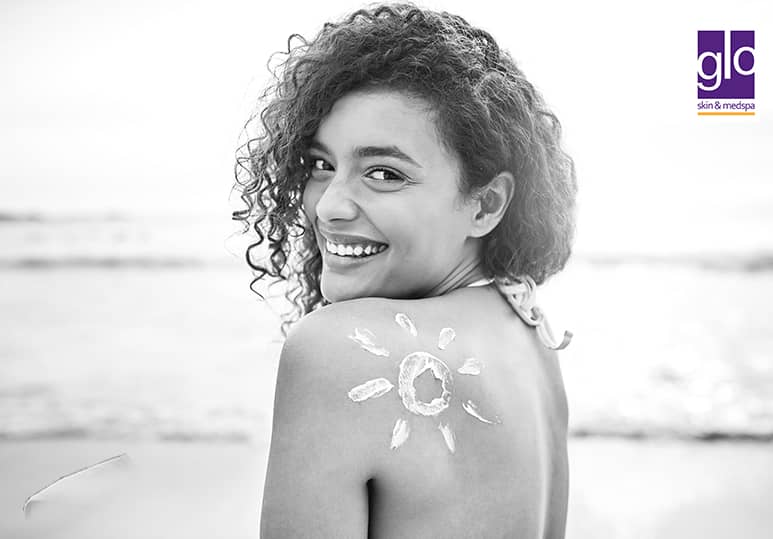UV Rays Versus Sunscreen
UV Rays And Their Effects
Ultraviolet (UV) rays are a form of high-energy radiation emitted from the sun. There are 3 forms of UV rays: UVA, UVB, and UVC. UVC rays are absorbed by the ozone layer and don’t make it to earth, and UVB rays are partially absorbed by the ozone layers but the rays that do get through are damaging to the outer layers of skin. UVA rays, however, deeply penetrate the skin all year long. When referring to UV rays, people are often referring to both UVA and UVB rays. Because of their short wavelength and high energy, UV rays cannot be perceived by the naked eye, but they can still affect us. When the skin is exposed to UV rays, it generates free radicals, which are a kind of unstable atom that damages cells.
The damaging effects of UV rays cause sunburns, wrinkles, sun spots, leathery skin, actinic keratosis, immunologic problems, and cancer. Keeping yourself safe from UV rays is one of the best ways to prevent serious skin cancers such as melanoma.
How Sunscreen Protects Skin
Sunscreen acts as a barrier between your skin and damaging UV rays. Sunscreen contains organic compounds that begin a chemical reaction when exposed to UV rays, transforming them into heat and releasing said heat from the skin. Sunscreen essentially absorbs UV rays to then scatter and reflect them.
When you look at a bottle of sunscreen, you will see its SPF rating. SPF stands for sun protection factor and products with a higher level of SPF will allow fewer UV photons to reach the skin. A sunscreen’s SPF will tell you how long it will take before the sun begins to burn the skin compared to if you didn’t wear sunscreen. For example, an SPF 30 sunscreen will prevent you from burning for 30 times longer than if you wore no sunscreen. That being said, there is a point where the SPF measurements cap, with most skin care professionals recommending SPF 30 or SPF 45. Higher levels of SPF are suspected to protect the skin more from deep penetrating UVA rays but still need to be regularly reapplied.
Sunscreen should be applied half an hour before you go outdoors and should be reapplied every 2 hours. It should also be reapplied after swimming, sweating, or drying off. No matter how high the SPF rating is, you should always reapply sunscreen often. Remember to wear sunscreen all year long, not only in the summer. UV rays are always present and when it is snowy or when you’re out on the water, the UV is reflected off of the water particles and amplified.
Protect Your Skin With Help From Glo Skin In Calgary
Wearing sunscreen anytime you go outside is a great way to protect your skin. When the skin is exposed to UV rays for many years, age becomes more pronounced, as wrinkles develop faster, sunspots appear, and the texture of the skin changes. Wearing sunscreen often helps fight these negative effects to keep the skin more youthful and healthy. Wearing high-quality sunscreen with an SPF of 30 is a great preventative measure to take to not only keep your skin looking great, but also to protect against skin cancer. At Glo Skin and Medspa in Edmonton, our skin care specialists can help you choose the skin care products best suited to your skin type, including premium Vivier® sunscreen. To speak with a skin care specialist to determine what products can help keep your skin beautiful and healthy, contact Glo Skin and Medspa at 1-780-481-9772 or fill out the online contact form. Click here to shop our exceptional skin care line or click here for the Viver SPF 30 sunscreen.
FAQ
Q: What can I do to reduce my risk of skin cancer?
A: To practice good skin care:
- Always wear sunscreen when you leave the house and keep it with you to reapply throughout the day. Wear your sunscreen even on cloudy or cold days.
- Try to cover up with long-sleeved shirts, hats, and UV blocking sunglasses.
- Check your skin for moles and spots and note any changes in size or colour.
- Do not use tanning beds.
Q: How well does an SPF sunscreen protect against UV rays?
A: Sunscreen with an SPF of 30 blocks about 97% of UV rays.
Q: Can I use sunscreen and makeup?
A: You can and you should! While some sunscreens may make the face oily and make it difficult to apply makeup, the Vivier® Sunscreen Lotion can be used alone or under makeup. Getting used to putting sunscreen under your makeup is a great skin care step to incorporate into your routine.



